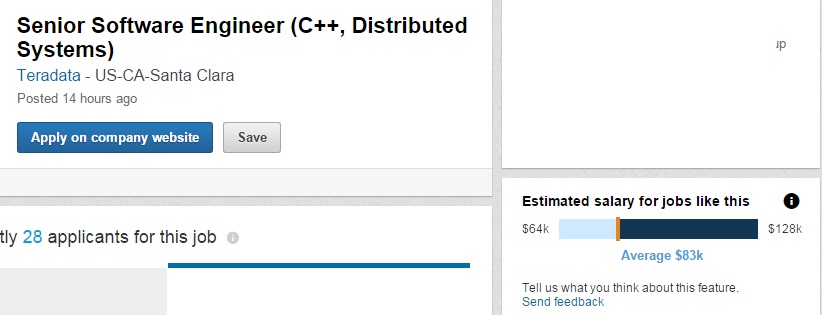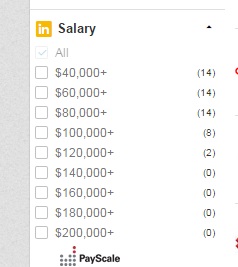Why You Lose Potential Candidates with LinkedIn Job Posts
Source: Irina
 This post on LinkedIn got featured in the "Recruiting & Hiring" channel! (maybe they don't read posts before featuring?)
This post on LinkedIn got featured in the "Recruiting & Hiring" channel! (maybe they don't read posts before featuring?)
Salary
While professionals may consider changing jobs for many reasons other than money, the salary is one of the most important factors. If you post jobs on LinkedIn, you need to be aware of the salary information, automatically communicated to your potential applicants. Look what happens when you post a job on LinkedIn.
Here is a screenshot of a job opening, showing the salary info. The low end shown is $67K, and the average is $88K.

job1
This job requires: "Bachelors with 6 years of industry experience, Masters degree in computer science or related field with 4 years of industry experience, or PhD in computer science or related field with 2 years of industry experience.
Industry experience working for 3+ years in of system software development using C++ , and python. Knowledge of Java is a plus. Hands-on experience working on Linux/ Unix systems �C preferably RHEL and SLES." and more.
If you have even a tiny bit of experience hiring Software Engineers in the San Francisco Bay Area, you would be surprised seeing the "estimated" salary numbers. The real numbers are much higher. I would think that anyone with these qualifications, working in the industry, at this location is earning at least a six-digit salary.
Here's even more surprising salary info, in a similar but more senior job post:

The second post requires "Bachelors with 8 years of industry experience, Master’s degree in computer science or related field with 5 years of industry experience, or PhD in computer science or related field with 2 years of industry experience." - i.e. this post calls for more experience than the first one, yet the "estimated salary" is lower.
Now, suppose you are sharing a link to the job post with a potential candidate. If that person subscribes to a premium LinkedIn account (which is free for the first month), he or she will see the salary data on the job description and may hesitate whether to respond because of that.
Premium LinkedIn members can also search for jobs by the target salary range.
A job search for the title Software Engineer C++ with keywords Distributed Systems in the San Francisco Bay Area results in these salary choices:

The job seeker will likely assume that these salaries are provided by those who post jobs. In the above search results, out of 14 found job posts, only two seem to be in the realistic desirable salary range. The potential applicant will filter out the jobs where the salary is (wrongly!) stated as too low for him or her to apply.
The wrong (or the right) estimated salary information is provided by the site payscale.com and is included on LinkedIn job posts and in the LinkedIn advanced job search dialog. The info may be misleading, but we have no control over it other than changing the job description.
Conclusion: If you don't want to lose potential candidates, you may have to tweak your LinkedIn job description to sound more senior - to raise that estimated auto-calculated salary range. (Well, you'd better do this at least if you are looking for Senior C++ Developers in the Bay Area!)
Since we have little idea about the payscale.com algorithms, we'd have to guess what the right job titles and wording should be for the salary ranges to look more on target. Since we also need to provide correct information in the job description, editing may be challenging and time consuming. But who wants to lose potentially qualified candidates?
Your comments are welcome.
| }
|